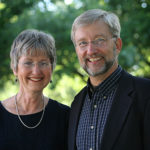During my years as a pastor, the question I have been asked most frequently is “Where is God when bad things happen?” The question may follow a devastating storm, an unexpected diagnosis or a catastrophic event. The contexts vary, but the query is the same.
 Barry HowardThis question has perplexed and frustrated people afflicted with suffering, grief and pain. Theologians and philosophers have wrestled with scriptural texts and rational thought, striving to make sense of the enigma. Pastors and counselors continually search for explanations that provide encouragement and hope for people scarred by raw human experience.
Barry HowardThis question has perplexed and frustrated people afflicted with suffering, grief and pain. Theologians and philosophers have wrestled with scriptural texts and rational thought, striving to make sense of the enigma. Pastors and counselors continually search for explanations that provide encouragement and hope for people scarred by raw human experience.
In one sense, to attempt to respond to such a challenging question can seem arrogant or presumptuous. In another sense, the question begs to be addressed but is entirely too big to have a simple, singular answer.
Religious clichés and slogans may offer momentary hope or comfort, but to the person who is hurting, “canned” religious answers seem hollow, shallow and often insulting. As a pastor, I only know to be transparent and confessional in sharing with my congregation how I am processing the question in hopes that my small insight might provide a little light for those dealing with the question from a dark place:
Life is not fair.
I wish someone had taught me this when I was much younger. My early faith was predicated on naïve assumptions: God is good, and life is fair. If I go to church, read my Bible, pray and try to keep the commandments, I will prosper, and God will protect me. If I misbehave, bad things will happen.
Now I would be inclined to say, “God is good, but life can be tough and often unfair.”
No one is exempt from pain or suffering.
Suffering is no respecter of persons. Tragedies do not distinguish between atheists, agnostics or devout believers. Accidents happen, disease invades, storms blow and wars erupt, and it is presumptuous to think we will not be affected because we have been more spiritual than our neighbors.
Sign up for our weekly edition and get all our headlines in your inbox on Thursdays
Faith does not exempt us from the bad stuff. Faith equips us for the journey.
God is present at all times, even in the chaos.
I believe God is present with us, not as the perpetrator of the chaos, but as the giver of courage and strength as we deal with the chaos. God does not necessarily rescue us from the chaos, but God is present in the midst of it, helping us navigate the chaos.
Pray regularly, perhaps even more when the bad stuff happens.
Nevertheless, there is no formula or spiritual incantation to predict or mandate that God will directly intervene the way I prefer. In the Bible, there are times when God seems to intervene in the chaos and other times when God does not. I don’t think our prayers are answered according to popular vote.
As an ongoing conversation with God, prayer equips us to walk by faith with courage and perseverance, and sometimes this means making the most of challenging circumstances. A false premise of a “name it and claim it” approach to religion is that it makes a promise based on isolated Scriptures taken out of context, mostly disregarding the suffering of people of faith throughout the Bible.
We tend to learn valuable things about God, life and ourselves during the tough seasons.
That doesn’t mean God sends a storm or an illness merely to teach us lessons. However, people often share with me how God has opened their eyes to new insights during extremely tough times.
In those occasions, God is not absent but definitively present. The Bible confirms God is present and proactive in all our circumstances (Romans 8:28). The presence and personality of God, referred to in the Bible as the Holy Spirit, resides within every believer, not because we merit a holy status, but as one of many gifts of God. The Spirit convicts, comforts and coaches us according to the conscience and character of Jesus.
Furthermore, we believe God is present in the corporate body of Christ—the church. When we observe the Lord’s Supper, we partake of the bread and cup as a vivid reminder of the death, burial and resurrection of Jesus. Among other things, these elements remind us we now are the body of Christ in the world. We are his hands, his feet, his voice and his passion, especially during tough times.
In every season, we become the human conduit through which God is at work to share love, comfort, healing and encouragement. When we are passive in our faith or we choose to live a self-centered life, we essentially contribute to a neuropathy in the corporate body of Christ. When we unite our gifts and resources with others who are motivated by a similar faith, life-giving ministry occurs, especially in the face of chaos.
As we wrestle with the question “Where is God when the bad stuff happens?” we must readily admit that “now I see through a glass darkly” (1 Corinthians 13:12). Yet when we affirm God is present in our suffering, grief or pain, we begin to look for God’s presence to bring a little light to the dark places in life. And this light gives us courage and endurance for the living of these days.
Barry Howard is pastor of First Baptist Church in Pensacola, Fla., and a coach with the Center for Healthy Churches.














We seek to connect God’s story and God’s people around the world. To learn more about God’s story, click here.
Send comments and feedback to Eric Black, our editor. For comments to be published, please specify “letter to the editor.” Maximum length for publication is 300 words.